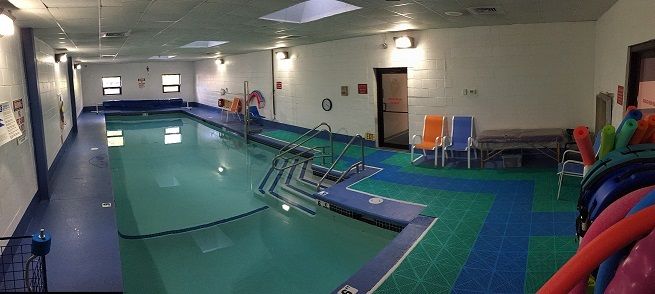What is Aquatic Therapy?
Aquatic therapy, also known as hydrotherapy, involves exercises and activities performed in water under the guidance of a trained therapist. It’s beneficial for rehabilitation, improving flexibility, strength, and overall fitness, while minimizing stress on the joints.
Aquatic therapy offers an alternative form of rehabilitation and can be used in conjunction with more traditional outpatient therapies. Our indoor heated pool provides an excellent medium in which to rehabilitate patients with both neurological and musculoskeletal injuries. It provides an opportunity to exercise and gain strength while affording individuals a comfortable environment where they can re-initiate limb and body movement.
Water is the perfect environment for those patients who may not be quite ready for land-based exercise programs. It is an environment that is supportive, controllable, and relaxing. It is used for recovery, prevention, and overall wellness of a wide patient population. Coordination and aerobic actives can also be performed in the pool.
What are the Benefits of Aquatic Therapy?
Aquatic therapy offers several benefits. Being in water significantly reduces stress throughout the body and facilitates healing. Much of the benefit in water is due to the countless properties it holds. Some of these properties include buoyancy, hydrostatic pressure, viscosity and fluid dynamics.
The buoyancy of the water facilitates mobility and assists with exercise. Its properties of decreasing impact while promoting movement allows for a variety individuals to perform exercises while decreasing pain. The hydrostatic pressure exerts more compression on the extremities facilitating fluid movement towards the center of the body improving individuals with swelling and peripheral vascular disease. This increased pressure can also help improve lung function in individuals with chronic obstructive pulmonary disease (COPD).
In addition, our deep-water area can assist with resistance exercise for strengthening as well as further reducing the impact of gravity, through de-loading, to benefit individuals with more severe weight-bearing related injuries like herniated discs and severe arthritis.
Injuries and Conditions Treated by Aquatic Therapy
Patients with a variety of orthopedic and neurological injuries and conditions can benefit from aquatic therapy. These include:
- Orthopedic: Osteoarthritis, hip replacements, joint reconstruction, shoulder surgeries, ankle surgeries, spinal surgeries (fusions, laminectomies, discectomies), herniated discs, spinal stenosis, sprains and strains, lower back pain.
- Neurological: Peripheral neuropathies, reflex sympathetic dystrophy (RSD), nerve root injuries, balance and equilibrium deficits, Parkinson’s, Chronic Obstructive Pulmonary Disease, fibromyalgia, and diabetes.
- Additional conditions: Rheumatoid Arthritis and peripheral vascular diseases.
